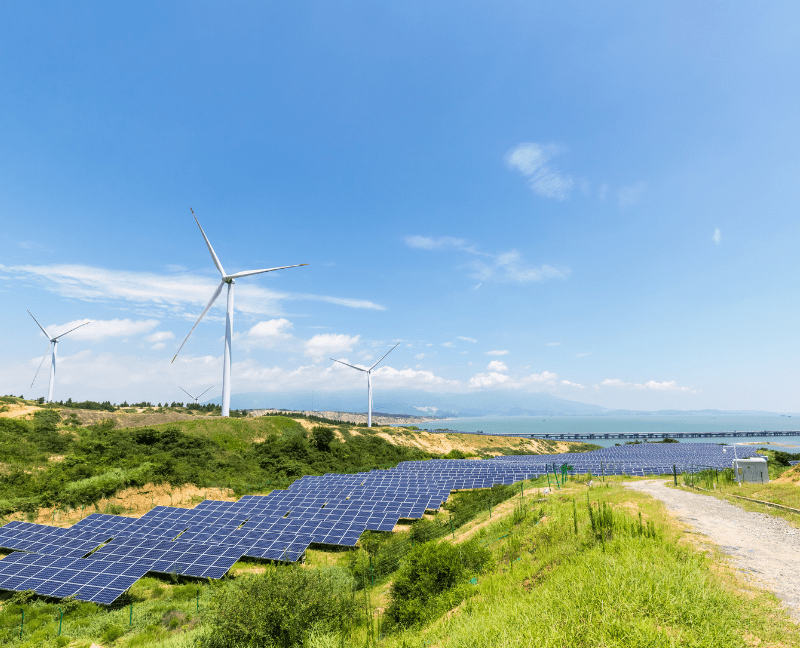We often hear or see the words “Renewable Energy” but what exactly is it and how does it help the environment and people?
In this post, we’ll dive deeper into green energy, which is the fastest-growing energy source in the world, and how we can use it to improve the climate, the environment, the economy, and social cohesion.
But First, What Is Renewable Energy?
Renewable energy is energy produced from natural resources that regenerate themselves without depleting the planet’s resources in less than a human lifetime. These resources, which include biomass, tides, waves, sunshine, wind, rain, and thermal energy stored in the earth’s crust, have the advantage of being accessible in some capacity almost everywhere. They practically never run out and won’t harm the climate or the environment that much compared to other sources.
On the other hand, fossil fuels like oil, coal, and natural gas are only found in limited amounts. Sooner or later, they might run out because of continuous consumption. They might be produced naturally; however, even though they are created through natural processes, they do not refill quickly.

Now, let’s talk about how renewable energy benefits everyone.
What Are Some Benefits Of Renewable Energy
All energy sources affect our environment, just like any human activity. Every energy source has trade-offs, and renewable energy is no exception. Even so, there is no denying the fact that renewable energy is more beneficial than fossil fuels, which are known to be destructive. This includes reduced water and land consumption, less air and water pollution, less loss of wildlife and habitat, and no or lower glasshouse gas emissions.
Also, their local and decentralised nature as well as technological advancement provide significant positive effects for the populace and economy.
Renewable Energy Produces Little Or No Glasshouse Gas Emissions
Fossil fuels are burned to produce energy, which produces a sizable amount of glasshouse gas emissions that contribute to global warming. Even when taking into account the entire life cycle of the technologies, the majority of renewable energy sources produce negligible to no emissions, which is good for the environment.
Renewable Energy Produces Little Or No Air Pollution
Renewable energy sources, such as solar, wind, and hydroelectric power, produce little to no air pollution. This is in contrast to fossil fuel-based energy sources, such as coal, oil, and natural gas, which release significant amounts of air pollutants such as carbon dioxide, sulfur dioxide, nitrogen oxides, and particulate matter when they are burned.
Air pollution is a major public health issue, contributing to a range of health problems including respiratory diseases, heart disease, stroke, and lung cancer. By reducing the number of air pollutants emitted, renewable energy sources can help to improve public health and reduce healthcare costs.
Renewable Energy Is Cheaper
Energy price increases and restricted access to resources are often companions of geopolitical conflict and turmoil. Local production of renewable energy makes it less susceptible to supply chain breakdowns, price increases, and geopolitical crises.
This is just one of the many benefits of renewable energy for businesses.
Renewable Energy Provides Economic Opportunities And Jobs
As the renewable energy sector grows, it creates jobs in fields such as engineering, construction, manufacturing, installation, and maintenance. According to the International Renewable Energy Agency (IRENA), the renewable energy sector employed over 12 million people globally in 2019, with the potential for up to 42 million jobs by 2050.
In addition, renewable energy projects often require local expertise and resources, which can stimulate local economies and provide opportunities for local businesses. For example, the development of wind or solar power projects can create jobs in the construction industry and provide opportunities for local suppliers of materials and services.
The renewable energy sector can provide economic benefits by reducing dependence on imported fossil fuels and stabilizing energy prices. This can increase energy security and reduce the impact of volatile fuel prices on industries and consumers.
Overall, the growth of renewable energy can provide a range of economic benefits and job creation opportunities, both locally and globally.
Renewable Energy Is For Everyone
Renewable energy sources are currently the most affordable source of new power production technology in many parts of the world, and their costs are going down. Renewable energy is the only method to increase energy access for all residents, particularly for those living in urban slums and informal settlements, in suburban and peri-urban areas, and distant places, especially for cities in middle- and low-income countries.
These are just some of the main reasons why renewable energy is beneficial. It’s not only good for the environment; it also helps the people, the entire community, and the future generation.
If you want to switch to cleaner, healthier energy, Pacific Energy Group is here to help. Just leave a comment below or email us at sales@pacificenergygroup.com.au
